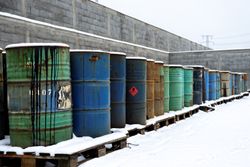5 Common Causes of Groundwater Contamination

Groundwater is a vital resource frequently collected for industrial, agricultural, and municipal purposes. Unfortunately, human activity can sometimes pollute water supplies, which is why well monitoring is an essential process to analyze groundwater samples for signs of contamination. The following guide explores where these contaminants may come from.
What Causes Groundwater Contamination?
1. Septic Systems
A septic system is meant to slowly and safely drain waste, known as effluent, into the soil. In most cases, these systems must be placed at a specific distance from drinking water wells to prevent contamination. If a septic system is improperly designed, constructed, installed, or maintained, it can pollute the groundwater.
2. Underground Storage Tanks
Storage tanks holding gasoline, oil, and various chemicals are sometimes stored underground. These tanks are often neglected due to their placement. Over time, they begin to corrode and crack, leaking contaminants into the ground. This can become a serious health hazard if these substances reach groundwater, but well monitoring can detect these harmful elements.
3. Hazardous Waste
Hazardous waste must  always be disposed of through an authorized municipal or licensed private collection facility. Every day, hazardous substances, such as paint thinners, motor oil, medicines, and toxic chemicals, are poured down drains and illegal dumping sites, possibly contaminating water sources. Even abandoned hazardous waste sites can be sources of pollution when unmonitored containers leak dangerous materials into the soil.
always be disposed of through an authorized municipal or licensed private collection facility. Every day, hazardous substances, such as paint thinners, motor oil, medicines, and toxic chemicals, are poured down drains and illegal dumping sites, possibly contaminating water sources. Even abandoned hazardous waste sites can be sources of pollution when unmonitored containers leak dangerous materials into the soil.
4. Road Salts, Fertilizers, & Pesticides
Using chemicals to melt ice and help crops, yards, and gardens grow has become a widespread practice. As a result, road salts, fertilizers, pesticides, and other chemicals applied to the surface have become common sources of runoff. When it rains, these substances can flow into the ground and contaminate groundwater.
5. Poorly Constructed Wells
If they’re poorly made, water wells themselves can be the cause of contamination. Wells with faulty or missing components may allow polluted groundwater to flow in. This issue is more common in older wells, so if you’re inheriting a property that uses a private water supply, well monitoring and groundwater sampling are critical steps in ensuring the quality of the source.
For dependable well monitoring, contact GeoTek Alaska. Based in Anchorage and serving clients across the state, these geotechnical drilling contractors employ safe, environmentally friendly methods to retrieve accurate subsurface data and test for contaminants without disturbing the soil. Learn more about their well monitoring solutions online. To speak with an experienced geoscientist, call (907) 569-5900.
About the Business
(6 reviews)
Have a question? Ask the experts!
Send your question

